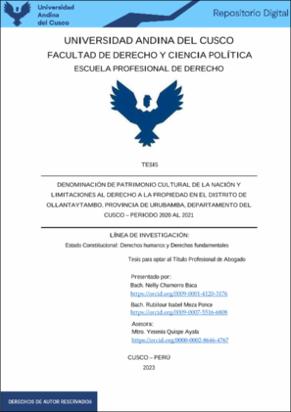| dc.contributor.advisor | Quispe Ayala, Yesenia | |
| dc.contributor.author | Chamorro Baca, Nelly | |
| dc.contributor.author | Meza Ponce, Rubilour Isabel | |
| dc.date.accessioned | 2024-04-04T21:01:50Z | |
| dc.date.available | 2024-04-04T21:01:50Z | |
| dc.date.issued | 2023-12-11 | |
| dc.identifier.uri | https://hdl.handle.net/20.500.12557/6215 | |
| dc.description.abstract | Limitaciones al derecho a la propiedad por la denominación de Patrimonio Cultural de la
Nación en el Distrito de Ollantaytambo-Urubamba-Cusco, 2020-2021, el tema de las
limitaciones al derecho de propiedad en torno a la denominación de Patrimonio Cultural de
la Nación en el Distrito de Ollantaytambo, es de gran relevancia y complejidad, se enfrenta
a un conflicto entre dos derechos protegidos: el derecho a la propiedad y la protección del
Patrimonio Cultural, ambos reconocidos por la Constitución; esta investigación se centra
en analizar cómo la condición de Patrimonio Cultural de la Nación afecta el uso, goce y
disfrute de la propiedad de los habitantes de Ollantaytambo; además de, cuáles son los
factores que hacen que se altere el Patrimonio Cultural. La presente investigación tiene
como propósito analizar las limitaciones que impone la denominación de Patrimonio
Cultural de la Nación en Ollantaytambo sobre el derecho de propiedad de sus habitantes.
Se busca comprender cómo esta condición afecta tanto a la población local como a su vez
el Patrimonio Cultural, además de analizar su normativa. Para abordar este tema, se empleó
una metodología cualitativa con un diseño descriptivo. Se realizó un análisis documental,
consultando el Plan Maestro de Ollantaytambo y el Plan de Desarrollo Urbano. Además, se
llevaron a cabo entrevistas a la población del distrito, funcionarios de la Municipalidad
Distrital y el Ministerio de Cultura. Estas fuentes proporcionaron información valiosa para
la investigación. Las conclusiones de la investigación están relacionadas con las
percepciones a partir de la investigación de la normatividad así como de los alcances de las
entrevistas, las cuales se consideran muy relevantes en encontrar información de primera
mano, finalmente se proponen algunas recomendaciones para que las limitaciones al
derecho de propiedad estén con un correcto balance con los otros derechos es decir, que la
condición de Patrimonio Cultural no limite la vivienda digna y calidad de vida de los
habitantes. | es_PE |
| dc.description.abstract | Limitations to the right to property by the denomination of Cultural Heritage of the Nation
in the District of Ollantaytambo-Urubamba-Cusco, 2020-2021, The issue of limitations to
the right to property around the denomination of Cultural Heritage of the Nation in the
District of Ollantaytambo, is of great relevance and complexity, it faces a conflict between
two protected rights: the right to property and the protection of Cultural heritage, both
recognized by the Constitution; this research focuses on analyzing how the condition of
Cultural Heritage of the Nation affects the use, enjoyment and enjoyment of the property
of the inhabitants of Ollantaytambo; in addition to, what are the factors that cause the
Cultural Heritage to be altered. The purpose of this research is to analyze the limitations
imposed by the denomination of Cultural Heritage of the Nation in Ollantaytambo on the
property rights of its inhabitants. It seeks to understand how this condition affects both the
local population and the Cultural Heritage, in addition to analyzing its regulations. A
qualitative methodology with a descriptive design was used to address this topic. A
documentary analysis was conducted, consulting the Ollantaytambo Master Plan and the
Urban Development Plan. In addition, interviews were conducted with the population of
the district, officials of the District Municipality and the Ministry of Culture. These sources
provided valuable information for the research. The conclusions of the research are related
to the perceptions from the investigation of the regulations as well as the scope of the
interviews, which are considered very relevant in finding first-hand information. Finally,
some recommendations are proposed so that the limitations to the right of property are in a
correct balance with the other rights, that is, that the condition of Cultural Heritage does
not limit the dignified housing and quality of life of the inhabitants. | en_US |
| dc.format | application/pdf | es_PE |
| dc.language.iso | spa | es_PE |
| dc.publisher | Universidad Andina del Cusco | es_PE |
| dc.rights | info:eu-repo/semantics/openAccess | es_PE |
| dc.rights.uri | https://creativecommons.org/licenses/by-nc-nd/4.0/ | es_PE |
| dc.subject | Derechos de propiedad | es_PE |
| dc.subject | Limitación | es_PE |
| dc.subject | Patrimonio cultural | es_PE |
| dc.subject | Denominación | es_PE |
| dc.subject | Ejercicio de la ley | es_PE |
| dc.title | Denominación de patrimonio cultural de la nación y limitaciones al derecho a la propiedad en el distrito de Ollantaytambo, provincia de Urubamba, departamento del Cusco – periodo 2020 al 2021 | es_PE |
| dc.type | info:eu-repo/semantics/bachelorThesis | es_PE |
| thesis.degree.name | Abogada | es_PE |
| thesis.degree.grantor | Universidad Andina del Cusco. Facultad de Derecho y Ciencia Política | es_PE |
| thesis.degree.discipline | Derecho | es_PE |
| dc.publisher.country | PE | es_PE |
| dc.subject.ocde | https://purl.org/pe-repo/ocde/ford#5.05.01 | es_PE |
| renati.advisor.dni | 24713954 | |
| renati.advisor.orcid | https://orcid.org/0000-0002-8646-4767 | es_PE |
| renati.author.dni | 75068200 | |
| renati.author.dni | 72751009 | |
| renati.discipline | 421016 | es_PE |
| renati.juror | Martiarena Gutierrez, Leoncio | |
| renati.juror | Pacheco Cueva, Joaquín | |
| renati.juror | Mercado Espejo, Ivonne | |
| renati.juror | Velasquez Curo, Ruth Amparo | |
| renati.level | https://purl.org/pe-repo/renati/level#tituloProfesional | es_PE |
| renati.type | https://purl.org/pe-repo/renati/type#tesis | es_PE |
| dc.description.lineadeinvestigacion | Estado Constitucional: Derechos humanos y Derechos fundamentales | es_PE |




